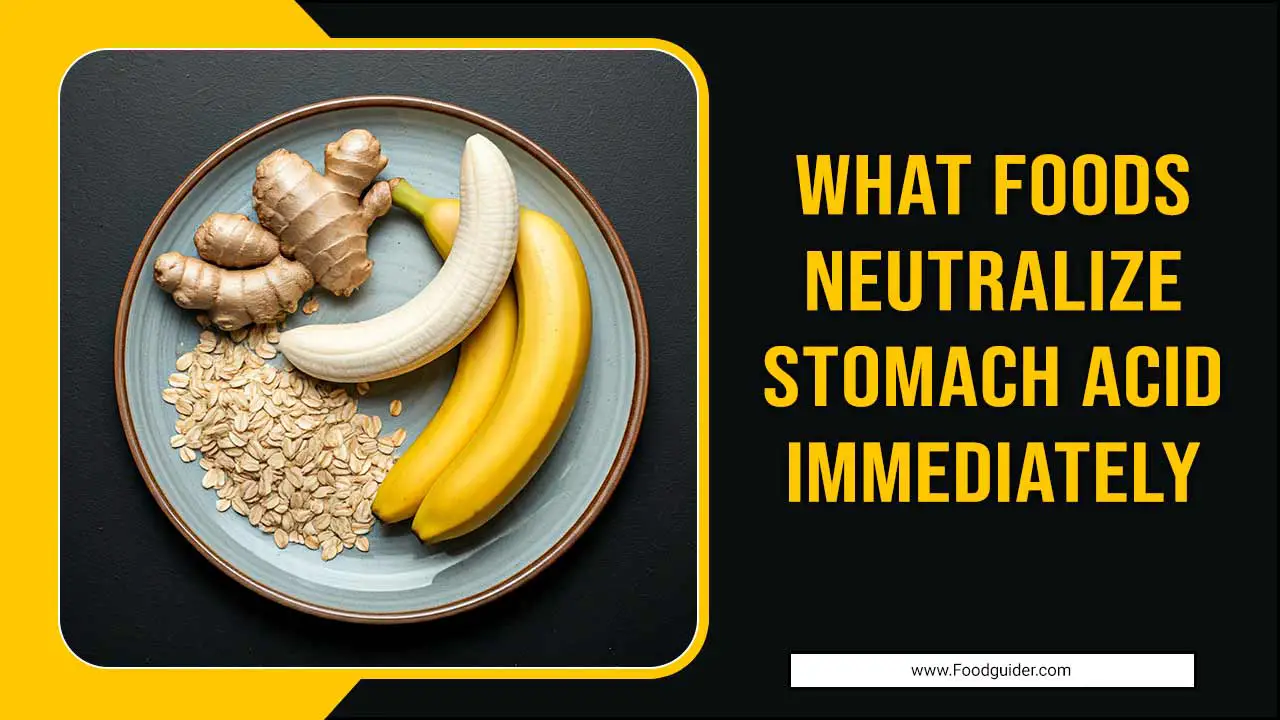Stomach acid plays a crucial role in digestion, but when acid production is excessive, it can cause discomfort. Many people experience acid reflux, a condition where stomach acid flows back into the esophagus, causing symptoms like heartburn, regurgitation, and even a sore throat.
Chronic acid reflux, or gastroesophageal reflux disease (GERD), is a more severe form of acid reflux that requires careful dietary management. Fortunately, certain foods can help neutralize stomach acid and provide relief. Here we explore which foods and dietary practices help combat stomach acidity effectively.

Understanding Acid Reflux And GERD
Acid reflux occurs when stomach acid escapes from the stomach into the esophagus, causing symptoms like burning pain in the chest (heartburn). GERD, or gastroesophageal reflux disease, is the chronic form of acid reflux. Persistent acid exposure can damage the esophagus lining, causing inflammation and discomfort. The Mayo Clinic emphasizes that understanding your triggers and following a GERD diet are key to managing symptoms and improving digestive health.
Symptoms Of Acid Reflux And GERD:
- Heartburn symptoms
- Regurgitation
- Sore throat
- Chest pain
- Difficulty swallowing
Foods That Help Neutralize Stomach Acid

- Non-Citrus Fruits
Fruits that are non-citrus, like bananas, apples, melons, and pears, are gentle on the stomach and can soothe reflux symptoms. Bananas, in particular, act as a natural antacid, reducing acid levels and relieving discomfort. - Oatmeal
Oatmeal is a whole grain food that absorbs excess stomach acid, providing relief from heartburn symptoms. With high fiber content, oatmeal is filling and supports digestive health without irritating the stomach lining. - Ginger
Ginger has anti-inflammatory properties that help ease digestive disorders. Its soothing effects can alleviate acid reflux and occasional heartburn. Fresh ginger in tea or cooking helps reduce acid production and settles the stomach. - Leafy Greens
Leafy greens like spinach, kale, and broccoli are alkaline foods that can neutralize stomach acid and lower acidity. These greens are also low in fat and sugar, making them ideal for reducing acid reflux symptoms. - Baking Soda Solution
Baking soda is a classic home remedy to neutralize stomach acid quickly. Dissolve a teaspoon in a glass of water to create an alkaline solution that counteracts stomach acid and offers quick relief. However, use this remedy sparingly, as excess baking soda can upset the stomach. - Almonds
Almonds are alkaline and can help neutralize gastric acid. Raw, unsweetened almonds provide healthy fats that promote digestive health and help reduce acid reflux symptoms. - Yogurt
Yogurt is soothing to the stomach lining and promotes the growth of healthy bacteria in the gut. Low-fat yogurt, in particular, provides relief from acid reflux and helps balance stomach acidity levels. - Whole-Grain Bread and Brown Rice
Whole grains help absorb stomach acid and reduce acid production. Whole-grain bread, brown rice, and pasta are excellent choices for a GERD diet.
Foods To Avoid
Certain foods are known to increase stomach acid production, leading to acid reflux and GERD symptoms. It’s important to identify these trigger foods and limit them.
- Spicy Foods: Spicy dishes can irritate the stomach lining, increasing acidity and causing heartburn.
- Fried Food: Fried foods are high in fat, which slows digestion and increases acid production, leading to reflux.
- Citrus Fruits and Juices: Acidic foods like oranges, lemons, and lime aggravate acid reflux symptoms. Lemon juice, while acidic, should be consumed in moderation.
- Chocolate and Cookies: Chocolate contains caffeine and fat, which can trigger acid reflux symptoms. Cookies with high sugar and fat content can have a similar effect.
- Caffeinated Beverages: Coffee and soda stimulate gastric acid production and relax the lower esophageal sphincter, allowing acid to escape the stomach.
Tips For Managing Acid Reflux And GERD

In addition to incorporating neutralizing foods, certain habits can reduce reflux symptoms.
- Eat Smaller Meals: Smaller, frequent meals prevent the stomach from becoming too full and reduce the risk of reflux.
- Stay Upright After Eating: Avoid lying down immediately after meals. Gravity helps keep stomach contents down, preventing acid from traveling up into the esophagus.
- Limit Acidic Foods and Trigger Foods: Foods that stimulate gastric acid should be consumed sparingly. Avoid known triggers and stick to a GERD-friendly diet.
- Proton Pump Inhibitors (PPIs): For those with frequent heartburn and chronic acid reflux, PPIs are commonly prescribed to reduce stomach acid production.
- Stay Hydrated: Drinking water helps dilute gastric acid and provides heartburn relief.
Conclusion
Managing acid reflux and GERD often requires a combination of dietary changes and lifestyle adjustments. Including foods that neutralize stomach acid—such as bananas, oatmeal, and leafy greens—can help relieve heartburn and other reflux symptoms. Avoiding trigger foods, eating smaller meals, and staying upright after eating can further support digestive health.
For those experiencing chronic symptoms, it’s best to consult with a healthcare provider, such as a gastroenterologist, who may recommend additional treatments, including proton pump inhibitors. By following a GERD diet and using these home remedies, many people find relief and enjoy improved digestive comfort.
FAQs
1.What Is The Quickest Way To Neutralize Stomach Acid?
A baking soda solution (1 teaspoon dissolved in water) can offer immediate relief by neutralizing stomach acid. Bananas, oatmeal, and yogurt are also effective for quick relief.
2.Can Lemon Juice Help Reduce Stomach Acid?
While lemon juice is acidic, it is sometimes used in small amounts to support digestion. However, people with acid reflux should consume lemon juice cautiously, as it may trigger symptoms.
3.What Foods Should I Avoid If I Have Acid Reflux?
Avoid acidic and fatty foods like citrus fruits, fried food, chocolate, caffeine, and spicy dishes. These foods can increase acid production and worsen reflux symptoms.
4.How Can I Prevent Acid Reflux Symptoms Naturally?
Eating smaller meals, avoiding lying down after eating, staying hydrated, and incorporating alkaline foods like leafy greens and bananas can help prevent acid reflux naturally.
5.Can Eating Spicy Food Cause Acid Reflux?
Yes, spicy food can irritate the stomach lining and stimulate excess acid production, often triggering acid reflux symptoms.